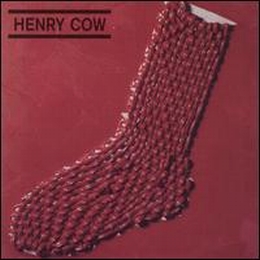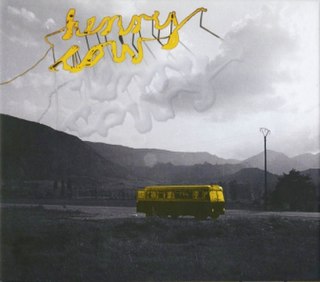Related Research Articles

Henry Cow were an English experimental rock group, founded at the University of Cambridge in 1968 by multi-instrumentalists Fred Frith and Tim Hodgkinson. Henry Cow's personnel fluctuated over their decade together, but drummer Chris Cutler, bassist John Greaves, and bassoonist/oboist Lindsay Cooper were important long-term members alongside Frith and Hodgkinson.

The Henry Cow Legend is the debut album of British avant-rock group Henry Cow. It was recorded at Virgin Records' Manor studios over three weeks in May and June 1973, mixed in July 1973, and released in September 1973.

Unrest is an album by British avant-rock group Henry Cow, recorded at Virgin Records' Manor studios in February and March 1974. It was their second album and was released in May 1974. It was their first album including oboe and bassoon player Lindsay Cooper, who replaced saxophonist Geoff Leigh. American critic Glenn Kenny said Cooper's presence on the album grounded the band in European art music.

Desperate Straights is a collaborative studio album by British avant-rock groups Slapp Happy and Henry Cow. It was recorded at Virgin Records' Manor Studio and Nova Sound Studios in November 1974, and released in February 1975. It was Slapp Happy's second album for Virgin, and they had invited Henry Cow to record with them.

In Praise of Learning is a studio album by British avant-rock group Henry Cow, recorded at Virgin Records' Manor studios in February and March 1975, and released in May 1975. On this album, Henry Cow had expanded to include members of Slapp Happy, who had merged with the group after the two had collaborated on Desperate Straights in 1974. The merger ended after recording In Praise of Learning when Peter Blegvad and Anthony Moore from Slapp Happy left the group.

Concerts is a live double album by English avant-rock group Henry Cow, recorded at concerts in London, Italy, the Netherlands and Norway between September 1974 and October 1975. Sides one and two of the LP record consist of composed material while sides three and four contain improvised pieces.

Western Culture is a studio album by English avant-rock group Henry Cow, recorded at Sunrise Studios in Kirchberg, Switzerland in January and July–August 1978. It was their last album and was released on Henry Cow's own private label, Broadcast, in 1979. Later editions appeared on Interzone in the US and Celluloid in France. Only the UK Broadcast pressing used the custom label artwork design.

Hopes and Fears is the debut album by the English avant-rock group Art Bears. It comprises tracks by Henry Cow, Art Bears's predecessor, recorded at Sunrise Studios, Kirchberg in Switzerland in January 1978, and tracks by Art Bears, recorded at Kaleidophon Studios in London in March 1978.

Henry Cow Box is a seven-CD limited edition box set by English avant-rock group Henry Cow. It was released in December 2006 by Recommended Records and comprises the six original albums Henry Cow released between 1973 and 1979, including those recorded with Slapp Happy. A bonus 3" CD-single was given to advance subscribers of the box set which contains previously unreleased material taken from live performances in Europe by the Orckestra, a merger of Henry Cow, the Mike Westbrook Brass Band and folk singer Frankie Armstrong in 1977. The two bonus CD Orckestra tracks were later reissued on the 2019 Henry Cow Box Redux: The Complete Henry Cow bonus CD, Ex Box – Collected Fragments 1971–1978.

Volume 6: Stockholm & Göteborg is a live album by English avant-rock group Henry Cow, and is disc 6 of the 10-disc 40th Anniversary Henry Cow Box Set. It was released in September 2008 by RēR Megacorp as a free-standing album in advance of the box set release in January 2009.

The 40th Anniversary Henry Cow Box Set is a nine-CD plus one-DVD limited edition box set by English avant-rock group Henry Cow, and was released by RēR Megacorp in January 2009. It consists of almost 10 hours of previously unreleased recordings made between 1972 and 1978 from concerts, radio broadcasts, one-off projects, events and the studio. Included are new compositions, over four hours of free improvisation, and live performances of some of Henry Cow's original LP repertoire.
"Erk Gah" is a song written by Tim Hodgkinson for the English experimental rock group Henry Cow. "Erk Gah" was performed live by the band between 1976 and 1978, but was never recorded in the studio; three live performances of the song would later be released on the live album Stockholm & Göteborg in 2008 and the compilation The 40th Anniversary Henry Cow Box Set in 2009. In 1993, fifteen years after Henry Cow disbanded, Hodgkinson recorded the composition under the title "Hold to the Zero Burn, Imagine" for his solo album Each in Our Own Thoughts (1994), featuring former Henry Cow members Chris Cutler, Lindsay Cooper, and Dagmar Krause.
"Living in the Heart of the Beast" is a 1975 song written by Tim Hodgkinson for the English avant-rock group Henry Cow. It was recorded in 1975 by Henry Cow with Slapp Happy, who had recently merged with Henry Cow after the two groups had recorded a collaborative album, Desperate Straights the previous year. The song was released on In Praise of Learning in May 1975 by Virgin Records. The song's title is a quote from the nineteenth-century Cuban poet and liberation fighter José Martí. "Living in the Heart of the Beast" was the first of two "epic" compositions Hodgkinson wrote for Henry Cow, the second being "Erk Gah" (1976), later known as "Hold to the Zero Burn, Imagine".

The Orckestra were a 12-piece English avant-garde jazz and avant-rock ensemble formed in March 1977 with the merger of avant-rock group Henry Cow, the Mike Westbrook Brass Band and folk singer Frankie Armstrong. They gave two performances in London in March and June 1977, and then embarked on two tours of Europe between September 1977 and May 1978, where they performed in Italy, France and Sweden.

The Virgin Years – Souvenir Box is a three-CD limited-edition box set by English avant-rock group Henry Cow. It was released in 1991 by Recommended Records and East Side Digital Records, and contains three albums Henry Cow made for Virgin Records between 1973 and 1975: Legend, Unrest and In Praise of Learning. Included in the box set is a 24-page souvenir booklet and a Henry Cow fold-out family tree.
"War" (originally entitled "War (Is Energy Enslaved)") is a 1975 song composed by Anthony Moore with lyrics by Peter Blegvad for the English avant-pop group Slapp Happy. It was recorded in November 1974 by Slapp Happy with Henry Cow for their collaborative album, Desperate Straights, but was only released in May 1975 on their second collaborative album, Henry Cow's In Praise of Learning.
"Ruins" is a 1974 instrumental composed by Fred Frith for the English avant-rock group Henry Cow. It was recorded in February and March 1974 by Henry Cow, and released on their May 1974 album, Unrest by Virgin Records.
"Nine Funerals of the Citizen King" is a 1973 song written by Tim Hodgkinson for the English avant-rock group Henry Cow. It was recorded in May and June 1973 by Henry Cow, and released in September 1973 on their debut album, Legend by Virgin Records.

The Henry Cow Box Redux: The Complete Henry Cow is a seventeen-CD plus one-DVD box set by English avant-rock group Henry Cow; it was released by RēR Megacorp in November 2019. The box set comprises the previously released 2006 Henry Cow Box and the 2009 40th Anniversary Henry Cow Box Set, totalling over sixteen hours. A bonus CD: Ex Box – Collected Fragments 1971–1978 was given to advance subscribers of the 2019 Box Redux, and contains newly recovered and previously unreleased recordings, plus the contents of the 2006 box set bonus CD-single: "Unreleased Orckestra Extract". The 2019 Box Redux plus the Ex Box bonus CD contains all the officially released studio and live recordings of Henry Cow, excluding "Bellycan" as released on the 1991 East Side Digital version of Legend, and the complete version of "The Glove" from the 1991 East Side Digital version of Unrest.
"Teenbeat" is a 1973 suite of three instrumentals, "Teenbeat Introduction", "Teenbeat" and "Teenbeat Reprise", by the English avant-rock group Henry Cow. The three pieces were composed by Henry Cow, Fred Frith and John Greaves, and Fred Frith respectively. They were recorded in May and June 1973, and released on Henry Cow's debut album, Legend by Virgin Records in September 1973.
References
- ↑ "Michel Edelin Quintet with special guest John Greaves: Echoes of Henry Cow". RogueArt. Retrieved 18 February 2020.
- 1 2 3 Fiori, Umberto. "Chris Cutler interview". Chris Cutler homepage. Retrieved 12 March 2020.
- 1 2 3 4 5 6 Piekut 2019, p. 228.
- ↑ Piekut 2019, p. 426 (Chapter 3, footnote 61).
- ↑ Piekut 2019, p. 117.
- 1 2 3 Piekut 2019, p. 190.
- ↑ Cutler 2009, p. 12.
- ↑ Piekut 2019, pp. 229–230.
- ↑ Piekut 2019, p. 324.
- ↑ Hegarty & Halliwell 2011, pp. 155–156.
- ↑ "Song of Solomon: Chapter 6". King James Bible Online. Retrieved 26 February 2020.
- 1 2 3 Recommended Records (2009). The 40th Anniversary Henry Cow Box Set (Box Set liner notes). Henry Cow.
- ↑ Piekut 2019, p. 229.
- ↑ Piekut 2019, pp. 228–229.
- 1 2 Hegarty & Halliwell 2011, p. 156.
- ↑ Martens, Matthew (October 1996). "Henry Cow". Perfect Sound Forever . Retrieved 12 March 2020.
- ↑ Trenwith, Roger (16 November 2019). "Henry Cow – Cow Box Redux". The Progressive Aspect. Retrieved 12 March 2020.
- ↑ MacDonald, Ian (7 June 1975). "Henry Cow: In Praise of Learning" . New Musical Express . ISSN 0028-6362 . Retrieved 11 June 2018– via Rock's Backpages.
- 1 2 Kenny, Glenn. "Henry Cow". Trouser Press . ISSN 0164-1883 . Retrieved 21 May 2020.
- ↑ Glanden, Brad (18 November 2006). "Henry Cow: Concerts". All About Jazz . Retrieved 12 March 2020.
- ↑ Clark, Philip (April 2008). "The Primer: Henry Cow". The Wire . No. 290. p. 45. ISSN 0952-0686.
- ↑ Piekut 2019, p. 230.
- ↑ "Henry Cow Chronology". Calyx: The Canterbury Music Website. Retrieved 23 February 2020.
- ↑ "Peel Sessions: 05/08/1975 – Henry Cow". BBC . Retrieved 13 March 2020.
- ↑ Compendium (1976). Concerts (LP liner notes). Henry Cow.
- ↑ Couture, François. "Henry Cow: The Road, Vols. 6–10". AllMusic . Retrieved 10 March 2020.